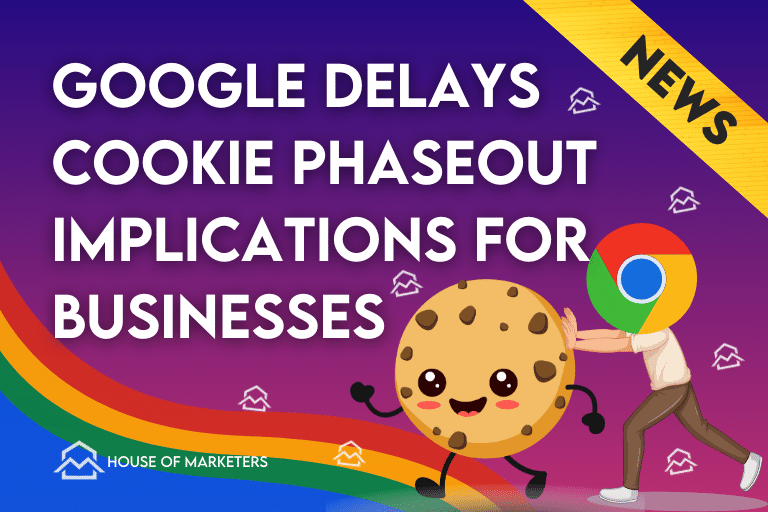Overview
- Google delays its plan to remove third-party cookies from Chrome.
- The delay allows more time for industry engagement and regulatory review.
- Websites will eventually have to transition from cookie tracking to Google’s Privacy Sandbox APIs.
- House of Marketers provides in-depth analysis on the implications for marketers, advertisers, and the broader digital ecosystem.

Will Chrome Ever Align with Its Peers in Privacy Practices?
Despite its status as the world’s most popular browser, Chrome continues to lag behind Apple’s Safari and Mozilla’s Firefox in phasing out third-party cookies.
Recently, Google has announced yet another postponement of this initiative, now extending the deadline to 2025.
This latest delay underscores the significant challenges that persist within the industry and regulatory environments, as well as the ongoing need for the development and refinement of new, privacy-focused technologies.
In their recent statement, Google acknowledged these complexities, emphasising the diverse feedback from stakeholders across the digital ecosystem:
“We recognize that there are ongoing challenges related to reconciling divergent feedback from the industry, regulators and developers, and will continue to engage closely with the entire ecosystem. It’s also critical that the CMA has sufficient time to review all evidence, including results from industry tests, which the CMA has asked market participants to provide by the end of June.”
The Privacy Sandbox: Google’s Alternative to Third-Party Cookies
In response to these challenges, Google introduced the Privacy Sandbox in 2023, aiming to redefine privacy standards within digital advertising. This initiative seeks to balance user privacy with marketing needs without relying on invasive tracking methods. This system is designed to track user interests directly within Chrome, allowing Google AdSense and other ad platforms to serve relevant ads without needing to track users across the web.
The UK’s concerns revolve around the potential for this system to give Google’s advertising division an unfair advantage over other advertisers who might not have the same level of integration or access to user data.
As Google stated, “It’s critical that the CMA has sufficient time to review all evidence, including results from industry tests”
House of Marketers Insight
The persistent delays in cookie deprecation have significant implications for digital marketers, who rely on third-party cookies for everything from behavioural targeting to performance analysis.
The continued use of third-party cookies and the transition to Google’s new system have significant implications for the digital advertising ecosystem:
Strategic Adjustments for Marketers
Advertisers and marketers need to prepare for a landscape where traditional cookie-based tracking is obsolete, requiring new strategies and technologies that comply with emerging privacy standards. Companies must accelerate the adoption of alternative tracking technologies such as first-party data collection, contextual advertising, and privacy-compliant targeting solutions like those proposed in Google’s Privacy Sandbox.
Pixel Ad Tracking Concerns
The phaseout impacts not only cookies but also the performance of pixel-based ad tracking, a mainstay in performance marketing. Marketers must explore alternative metrics and tools that align with privacy-focused advertising paradigms.
User-Centric Implications
For users, the protracted timeline is a double-edged sword, suggesting a cautious yet gradual transition to new privacy standards, which could disrupt or enhance online experiences depending on execution and user reception.
Technological and Regulatory Developments
Marketers must stay engaged with ongoing developments in Google’s Privacy Sandbox, testing and providing feedback to ensure new solutions meet industry needs without compromising privacy.
The evolution of browser privacy features is occurring in a broader context of increasing regulatory scrutiny, such as the GDPR in Europe and the CCPA in California.
These regulations mandate greater transparency and user control over personal data. Other browsers like Firefox and Safari have already implemented stricter privacy controls by blocking third-party cookies by default, setting a precedent that Google is gradually following.
Background and History
Third-party cookies have been a cornerstone of digital marketing, allowing advertisers to track user behaviour across websites to deliver targeted ads.
Here’s a timeline of major development regarding third-party cookies and their phase out by popular browsers:
- 2017 – Safari’s Initial Move Against Trackers
Apple’s Safari browser introduced Intelligent Tracking Prevention (ITP) to limit third-party trackers from capturing cross-site browsing data. - 2019 – Firefox Follows
Mozilla’s Firefox launched Enhanced Tracking Protection (ETP) by default, blocking many third-party cookies that tracked users’ web activities. - 2020 – Safari’s Strong Stance
Safari updated its ITP, effectively blocking almost all third-party cookies by default. - January 2020 – Google Announces Intention
Google announced its plan to phase out third-party cookies in Chrome within two years, aiming to enhance privacy while supporting ad revenue through other means. - 2021 – Google’s Initial Delay
Google delayed the phaseout of third-party cookies to 2023, citing the need for more time to develop and test the Privacy Sandbox technologies. - 2022 – Second Delay Announced
Google announced a further delay, extending the timeline to 2024. This was attributed to ongoing regulatory scrutiny and feedback from the advertising industry. - 2024 – Third Delay to 2025
Most recently, Google pushed the deadline to 2025. This delay allows for extended testing and refinement of the Privacy Sandbox alongside ensuring compliance with global regulatory standards and addressing industry concerns.
Significance and Future Outlook
The extended timeline for phasing out third-party cookies reflects the complexities of balancing user privacy with the needs of the digital advertising ecosystem. This development is significant as it not only impacts how marketers strategise but also signals a shift towards more privacy-conscious practices industry-wide.
As the situation develops, the industry will need to monitor Google’s adjustments and the CMA’s regulatory oversight to understand the future of web privacy and advertising. Google’s public testing suite for the new ad system is an opportunity for market participants to provide feedback, which will be critical as the CMA reviews all evidence before the planned cookie deprecation.
Stay ahead of the curve with the House of Marketers.
Interested in learning how to leverage TikTok and other social media platforms to grow your business? Contact us today for a free consultation about how we can boost your digital marketing strategy.

House of Marketers (HOM) is a leading TikTok Marketing Agency. Our global agency was built by early TikTok Employees & TikTok Partners, which gives us the insider knowledge to help leading brands, like Redbull, Playtika, Badoo, and HelloFresh win on TikTok. Want us to convert more of Gen Z and Millennials with TikTok? Get in touch with our friendly team, here.